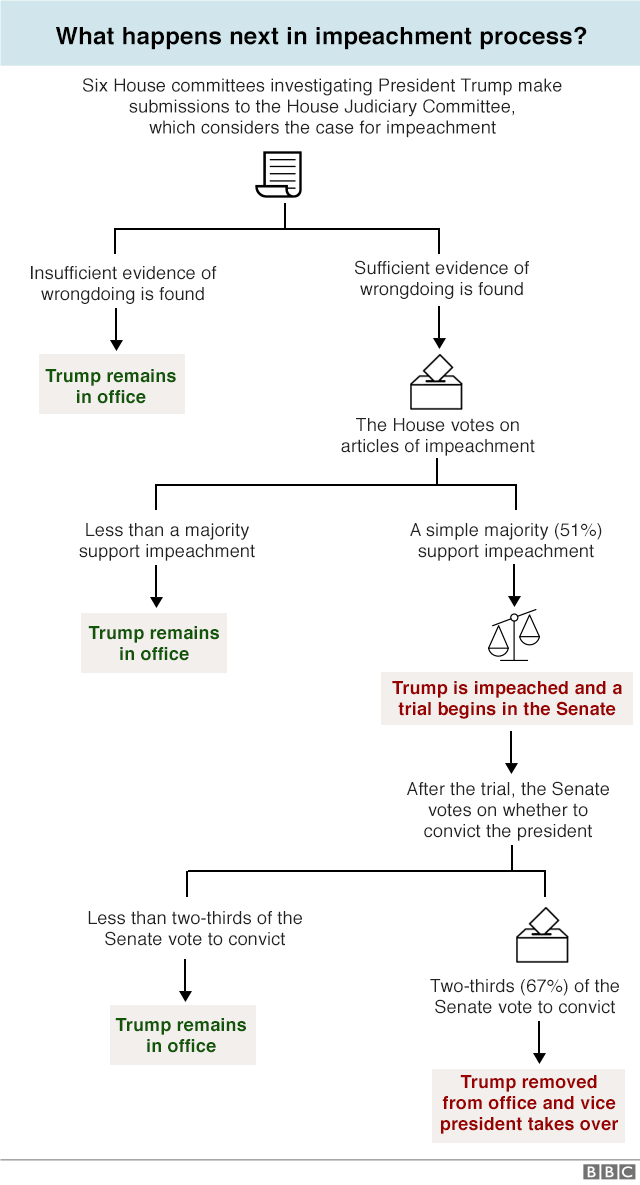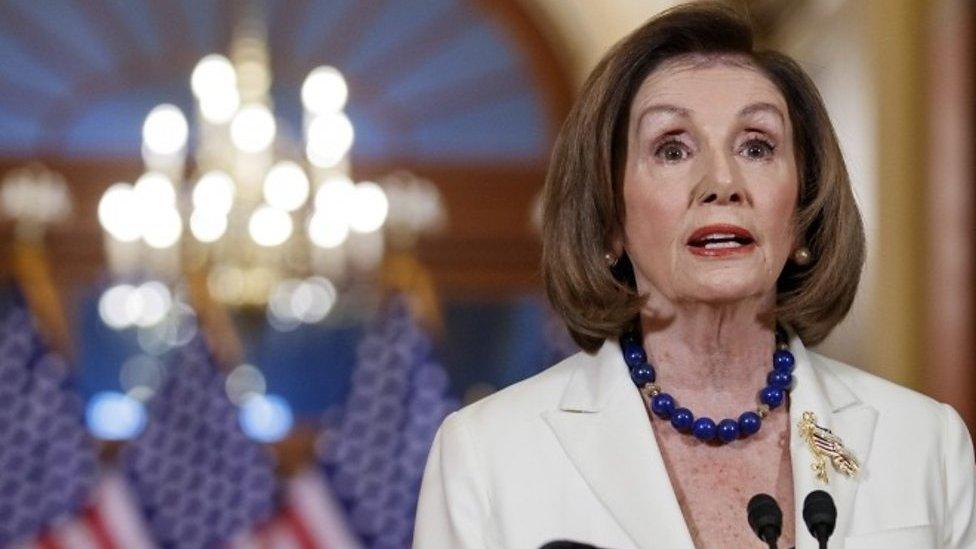Trump impeachment to go ahead, says House Speaker Nancy Pelosi
- Published
"Don't mess with me" - Nancy Pelosi's heated exchange with reporter
Speaker Nancy Pelosi says the House of Representatives will file impeachment charges against US President Donald Trump for alleged abuse of power.
"Our democracy is what is at stake, the president leaves us no choice but to act," the top elected Democrat said.
Mr Trump said Democrats have "gone crazy" and urged them to move quickly if they were going to impeach him.
Democrats say Mr Trump corruptly made military aid to Ukraine conditional on it investigating his rival Joe Biden.
What did Pelosi say?
The California congresswoman told Thursday morning's news conference: "The facts are uncontested. The president abused his power for his own political benefit at the expense of our national security, by withholding military aid and a crucial Oval Office meeting in exchange for an announcement for an investigation into his political rival."
She added: "Sadly, but with confidence and humility, with allegiance to our founders and a heart full of love for America, today I am asking our chairmen to proceed with articles of impeachment."
An impeachment vote might take place in the House of Representatives before the end of the year, and a trial in the Senate perhaps as early as January 2020.
In a later news conference, Mrs Pelosi upbraided a reporter who asked whether she hated the president.
"I don't hate anybody," she said, invoking her Catholic faith after striding back to the podium.
"I still pray for the president all the time. So don't mess with me when it comes to words like that!"
House Speaker Nancy Pelosi - "The president leaves us no choice but to act"
What did the White House say?
Mr Trump tweeted shortly before Mrs Pelosi's remarks: "If you are going to impeach me, do it now, fast, so we can have a fair trial in the Senate, and so that our country can get back to business."
White House press secretary Stephanie Grisham said immediately after Mrs Pelosi's remarks that Democrats "should be ashamed".
She added: "We look forward to a fair trial in the Senate."

No holds barred

Nancy Pelosi has given impeachment the green light. And while her announcement that articles will be drafted was light on details or a proposed timeline, her consent is really all that matters.
Mrs Pelosi has taken the pulse of the Democratic majority in the House of Representatives and determined her side is ready to act. And there's no better pulse-taker or vote-counter in Washington than the current Speaker of the House.
Meanwhile, in a series of blistering tweets, Donald Trump has indicated he's ready for the coming battle.
If there is a Senate trial - and Thursday's developments make that seem all but certain - it will be no-holds-barred political warfare.
While the president's fate still seems secure given Republican control of the chamber, there's no predicting who - if anyone - will emerge unscathed.
In an era where governmental norms and traditions have gone by the wayside, US politics have increasingly been reduced to a battle of wills and brute majority force. Such was the case with recent Supreme Court confirmation proceedings; such is the case with impeachment.
American voters will eventually have their say in November, but it will only be after months of bitter partisan warfare over the presidency itself.

Want to find out more?

A SIMPLE GUIDE: If you want a basic take, this one's for you
GO DEEPER: Here's a 100, 300 and 800-word summary of the story
WHAT'S IMPEACHMENT? A political process to remove a president
VIEW FROM TRUMP COUNTRY: Hear from residents of a West Virginia town
CONTEXT: Why Ukraine matters to the US
FACT-CHECK: Did Ukraine interfere in the 2016 election to help Clinton?
CASE FOR & AGAINST: What legal scholars say about Trump conduct
What does it take to impeach a president?

On Wednesday, three constitutional law experts testified to the House Judiciary Committee that Mr Trump's actions to obtain help from a foreign nation amounted to an impeachable offence.
A fourth professor said Mr Trump's actions were wrong, but not impeachable.
The Judiciary Committee is hearing from witnesses and is tasked with writing the articles of impeachment that the full House will later vote on.
Among formal impeachment charges expected to be considered by the judiciary committee are abuse of power, obstruction of justice and contempt of Congress.
How four legal experts see the impeachment inquiry
What is Trump accused of?
The impeachment process began in September after an anonymous whistleblower complained to Congress about a July phone call by Mr Trump to the president of Ukraine, in which Mr Trump appeared to tie US military assistance to Ukraine launching investigations which could help him politically.
Democrats say Mr Trump dangled two bargaining chips to Ukraine - $400m (£304m) of military aid that had already been allocated by Congress, and a White House meeting for Ukrainian President Volodymyr Zelensky - to obtain investigations. They think this alleged pressure on a vulnerable US ally constitutes an abuse of power.
The first investigation Mr Trump wanted from Ukraine was into former Vice-President Joe Biden, his main Democratic challenger, and his son Hunter. Hunter Biden joined the board of a Ukrainian energy company when his father was US vice-president.
The second Trump demand was that Ukraine should try to corroborate a conspiracy theory that Ukraine, not Russia, had interfered in the last US presidential election. This theory has been widely debunked, and US intelligence agencies are unanimous in saying Moscow was behind the hacking of Democratic Party emails in 2016.

How does impeachment work?
Impeachment is the first part - the charges - of a two-stage political process by which Congress can remove a president from office.
If, following the hearings, the House of Representatives votes to pass articles of impeachment, the Senate is forced to hold a trial.
A Senate vote requires a two-thirds majority to convict and remove the president - unlikely in this case, given that Mr Trump's party controls the chamber.
Only two US presidents in history - Bill Clinton and Andrew Johnson - have been impeached, but neither was convicted.
President Richard Nixon resigned before he could be impeached.



Learn more about the impeachment inquiry

- Published5 December 2019
